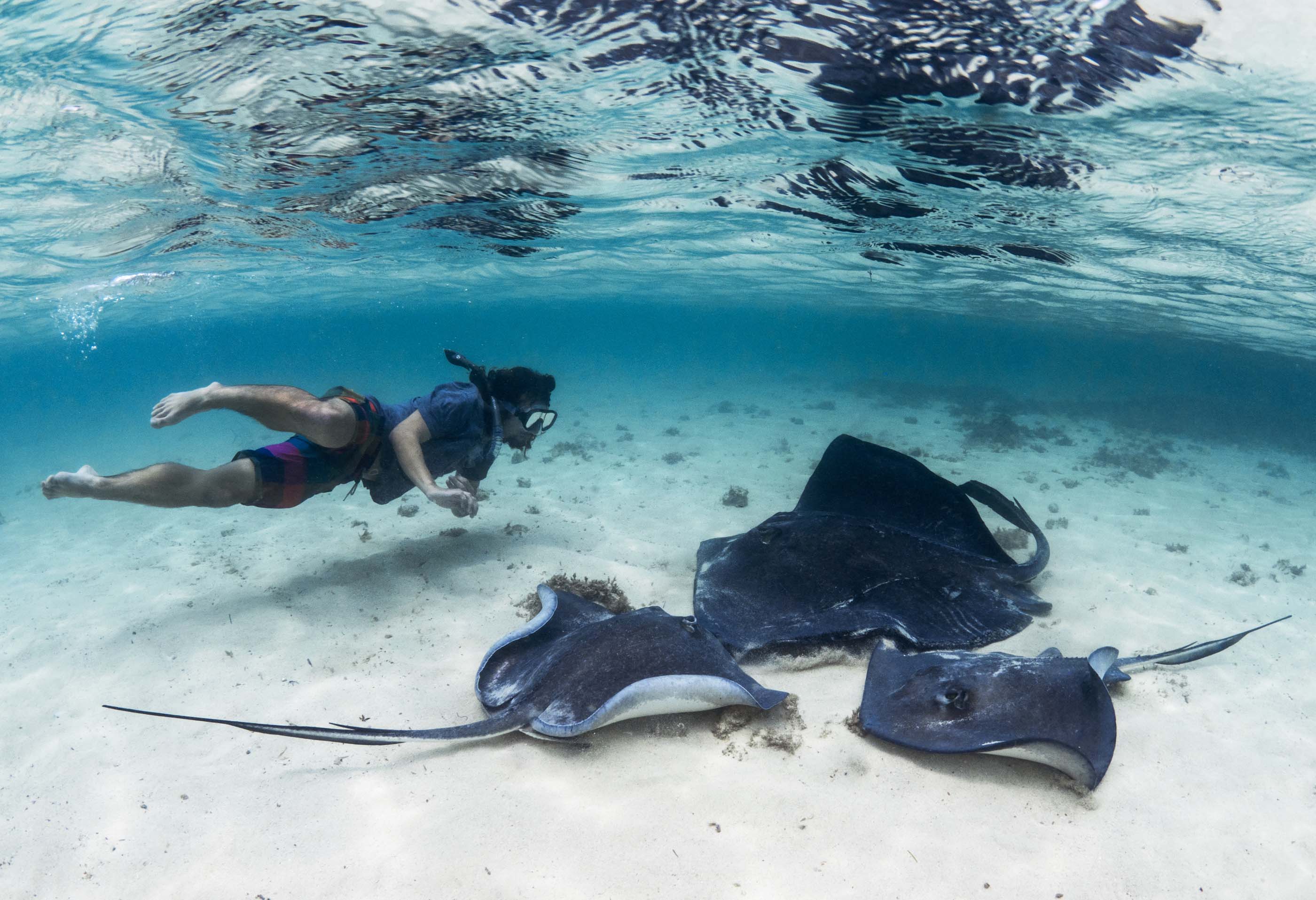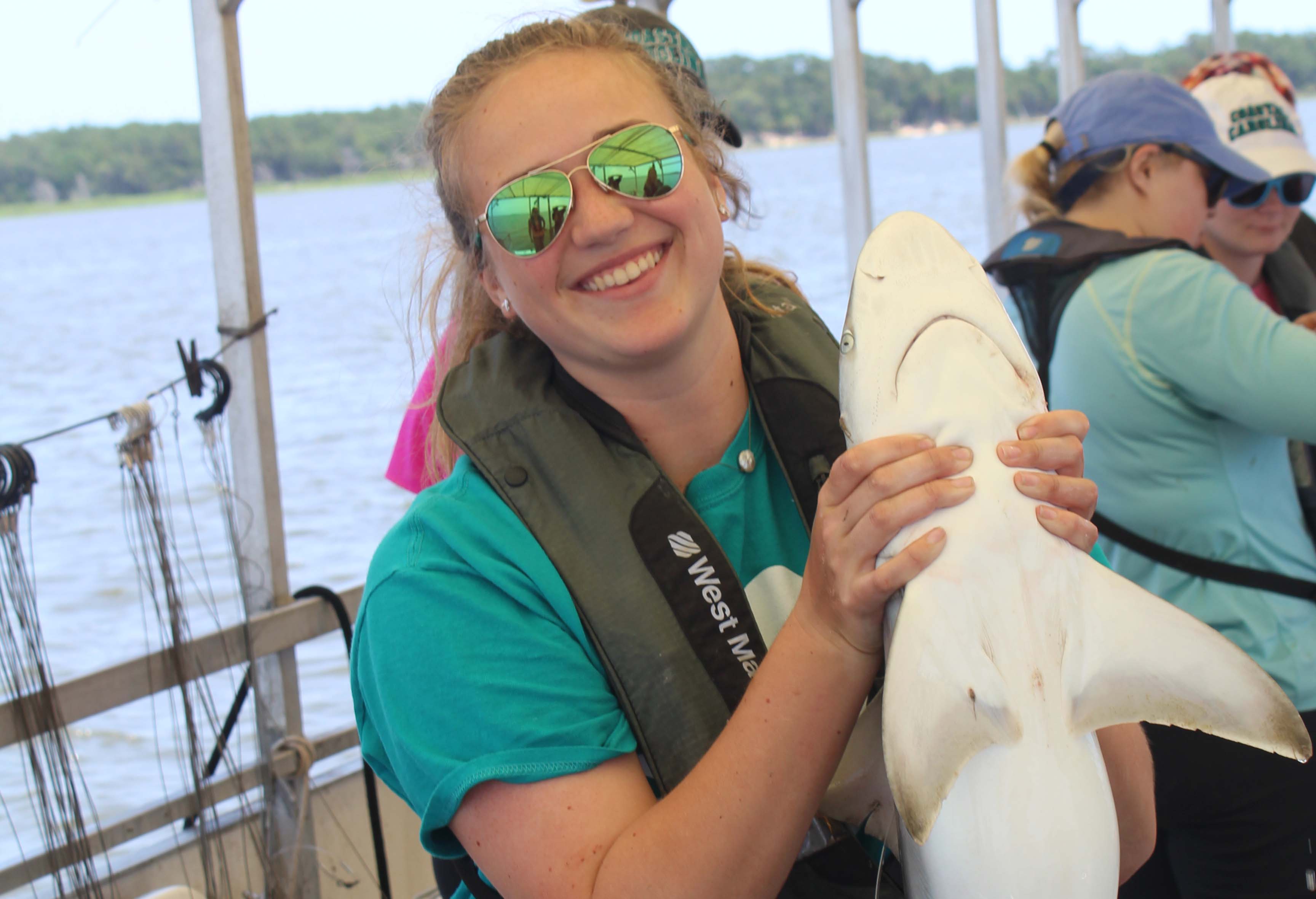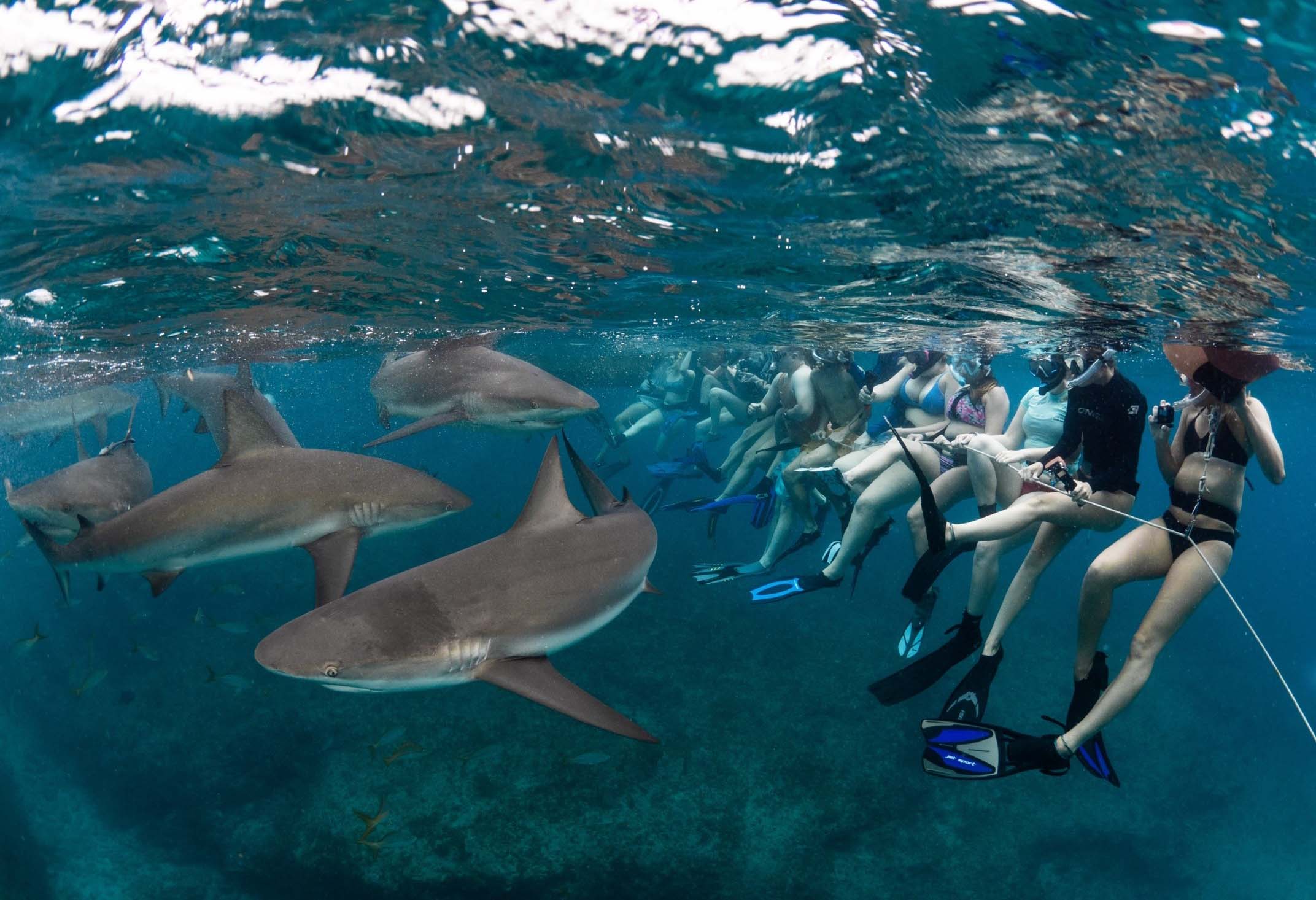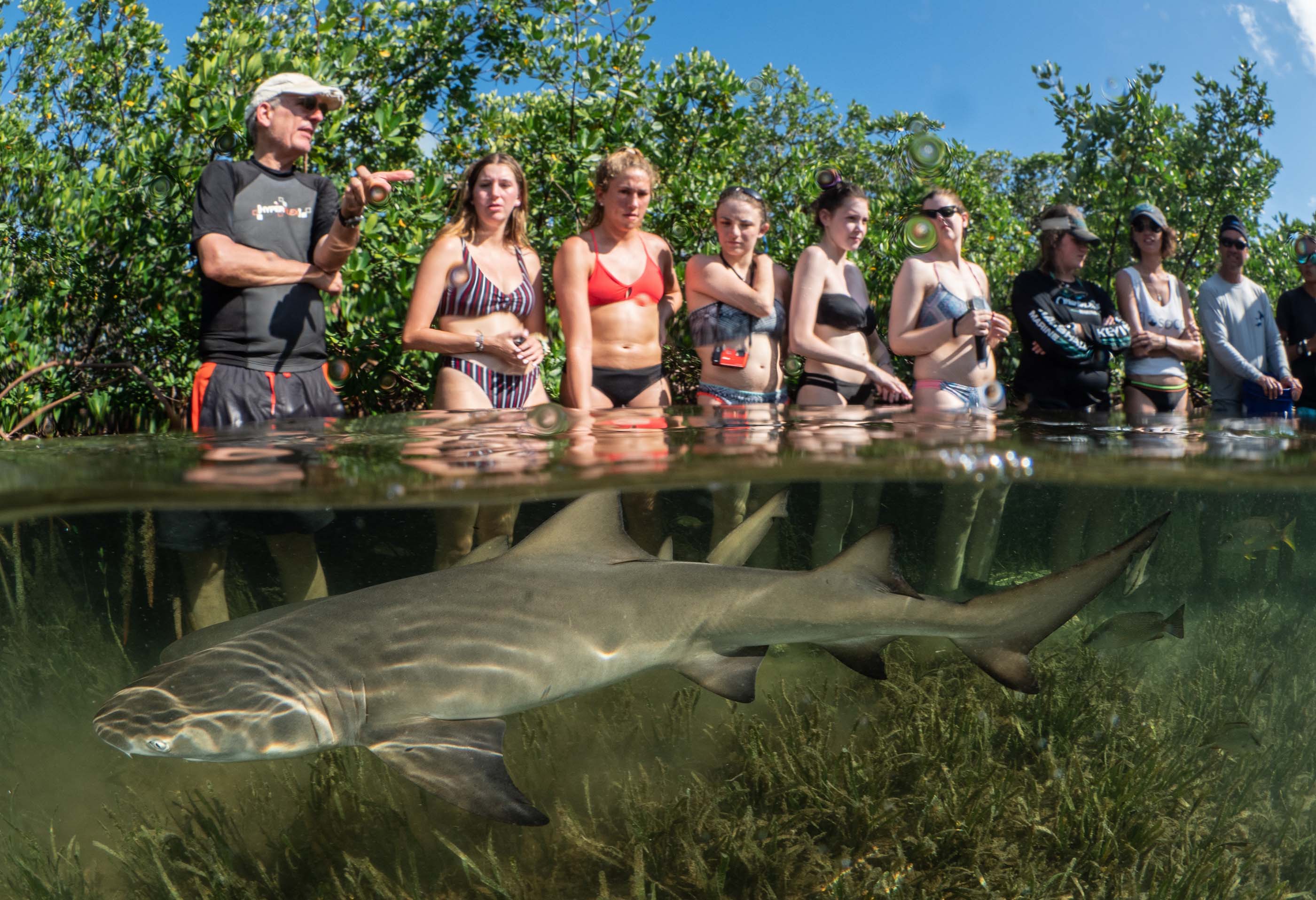Biology of Sharks in the Bahamas
Follow us on Instagram! @biminisharklab
Program Details
- Location: Bimini, Bahamas
- U.S. State Department Travel Information for The Bahamas
- U.S. State Department COVID-19 Information for The Bahamas
- Program Dates: May 8 - May 27, 2022
- Travel Dates: May 8 - May 15, 2022
- Cost: $4204 plus tuition, tech fee, and out-of-pocket expenses
- Online Application
Bimini is among the “sharkiest” settings on the planet, and the Bimini Biological Field Station is at the pinnacle of shark research locations globally. A variety of ecosystems is only a short boat trip (or even a shorter walk) from the lab. It is one of the few places where we can set and retrieve deepwater longlines, which target sharks that we would have no chance of seeing locally. In addition, luxury development and gambling interests threaten the Northern Lagoon of Bimini, an important nursery ground for lemon sharks. Students can read about international efforts to preserve the area, and then they can see for themselves what is happening there. We have been visiting Bimini annually (sometimes twice yearly) since 1996.
Students will do the following: Learn and practice basic lab and field techniques, including critical thinking, technical writing, oral presentation, handling live sharks, longlining, and gill netting.
“If you’re passionate about learning about sharks, especially in their environment, if you’re not afraid of swimming next to an 8-foot Caribbean Reef Shark, and if you don’t mind tropical ocean as one of your classrooms, then this rigorous introduction to shark biology might be just what yo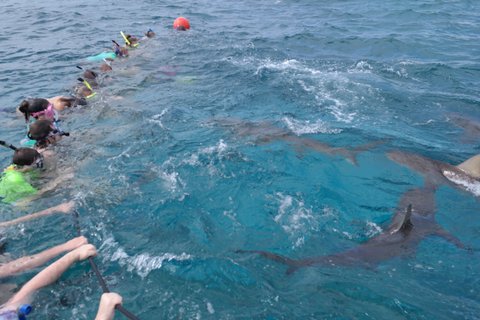
This faculty led program is an exceptional opportunity for marine science field experience in shark biology at the Bimini Biological Field Station (BBFS) in the Bahamas. The course features lectures, discussions, analysis of research papers, frequent field trips, video presentations, and personal encounters with several species of large, actively feeding, and free-swimming sharks. Lectures focus on broad aspects of the biology of sharks, including diversity, evolution, anatomy, physiology, behavior, ecology, fisheries, captive biology, conservation, and biomedical uses, using a textbook written by the instructor specifically for use in Biology of Sharks courses like this one. The majority of the academic work will be field-oriented. This fieldwork will introduce students to research techniques used at CCU and BBFS, where research on sharks has been ongoing for more than 24 years. Before leaving Bimini, students will participate in a number of classroom activities (lectures, discussions) focused on introducing them to the biology of sharks and their trip to Bimini. After returning, we will take several half-day research cruises on the R/V Coastal Explorer and RV Coastal Research, during which we will set several experimental sharks longlines. Any sharks captured will be identified, measured, sampled for DNA, and tagged and released. After a short but rigorous training session observing the experiences Coastal Carolina University shark team set and retrieve longlines and handle the sharks, students will be given the opportunity to do the same. Students often note that these cruises represent the highlight of their tenure at CCU. Biology of Sharks is truly the course that keeps on giving after graduating, many students return to the Bimini Biological Field Station as volunteers or interns, and several have earned paid positions at the lab.
Course Information
Students participating in this program will be enrolled in either the undergraduate- or graduate-level course and lab for a total of 4 credits.
MSCI 473 and MSCI 473L Biology of Sharks. (3 credits + 1 credit). (Prereq: BIOL 122 and permission of instructor). An introduction to the biology of sharks. Lecture component covers evolution, anatomy, behavior, natural history, physiology, conservation, and ecology. Lab topics will include taxonomy, diversity, anatomy, and physiology. Field activities will include capture, identification, work-up, and tagging of sharks; telemetry tracking; and observation of shark behavior in both their natural habitat and captivity. This course and laboratory will be held on campus, in local waters, and at BBFS.
Instructor: Dan Abel
MSCI 573, MSCI 573L Biology of Sharks. (3 credit + 1 credit). (Prereq: permission of instructor). This is a graduate-level course and lab on the biology of sharks.
Instructor: Dan Abel
Program Leaders
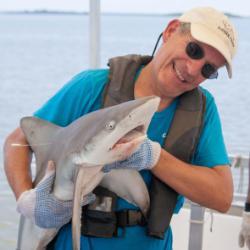 Daniel Abel, Professor, Department of Marine Science
Daniel Abel, Professor, Department of Marine Science
dabel@coastal.edu, 843-349-2257
Daniel C. Abel earned his Ph.D. in marine biology from the University of California San Diego's Scripps Institution of Oceanography, and he was postdoctoral fellow in marine biomedicine at the Medical University of South Carolina. His research focuses on the physiology and ecology of sharks and rays, and he is co-author of the textbooks Environmental Issues: Looking Towards a Sustainable Future (4th ed.), Environmental Oceanography, and Environmental Geology, and the forthcoming books Shark Biology and Conservation and Apex Predators of the World. He has been an award-winning environmental columnist, was founding director of CCU's Sustainability Initiative from 2006-2012, and currently serves on the board of directors of the Dogwood Alliance, a forest protection non-profit. Dr. Abel taught at sea and in more than 30 countries on the M/V Explorer with Semester at Sea in spring 2010 and summer 2012, 2013, and 2014. His annual Biology of Sharks course has been held at BBFS for more than 20 years. Dr. Abel is a Senior Fellow of the U.S. Partnership for Education for Sustainable Development, and he is the inaugural Honors Distinguished Faculty Fellow at Coastal Carolina University. He is a native South Carolinian and resides in Pawleys Island, SC.
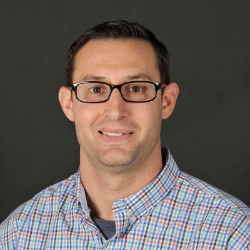 Derek Crane, Assistant Professor, Department of Biology
Derek Crane, Assistant Professor, Department of Biology
dcrane@coastal.edu, 843-349-4065
Dr. Crane is an Assistant Professor of Biology at Coastal Carolina University, where he teaches and conducts research on topics related to fish biology, ecology, and management of fishes. He completed his undergraduate degree at Lycoming College, M.S. at University of Michigan, and Ph.D. at SUNY-ESF, where he also was a postdoctoral researcher. Prior to joining the Biology Department at Coastal Carolina University in 2015, he was a research associate at Lake Superior State University. His research addresses issues related to ecology, conservation, and management of fishes and their habitats, and particularly enjoys collaborating with natural resource agency personnel to answer applied fisheries management questions. Working with his graduate students he has recently focused on modeling fish-habitat associations to provide guidance for habitat conservation and restoration, age estimation techniques for tarpon, growth and abundance of juvenile Atlantic sturgeon, and the effects of catch-and-release mortality on muskellunge.
Accommodations and Meals
Students will stay in accommodations located on-site and owned by Bimini Biological Field Station. For one night, the group will stay in a hotel in Florida. Breakfast, lunch and dinner will be provided at BBFS, with one group meal on the last evening. Students will be responsible for snacks and lunches on the road.
Additional Program Information
About the Bimini Biological Field Station (BBFS): This is a world-renown center of excellence in the study of shark biology, and the director, Dr. Samuel “Sonny” Gruber, is acknowledged as one of the world’s leading shark experts. During our stay at BBFS, we will be either participating in lectures, on a variety of field trips (see examples below), or engaging in informal discussions about sharks, careers, environmental issues, or ways that students can work their way back to the lab as a volunteer or staff member (numerous CCU students have done so!). Although the course schedule is rigidly set (e.g., breakfast at 0730, lecture from 0830 – 1000, feed lemon sharks and rays in shark pen from 1030 – 1200, etc.), we are at the mercy of the weather and the success of longlines. So a lecture might be interrupted by the presence of a 12-foot tiger shark on a longline, in which case we grab our snorkel gear, throw on a life vest (a Coastal Carolina University requirement), hop in one of the boats, and motor the 15 minutes to the line. Once there, we will watch as the shark is worked up, then while the animal is tethered to the boat, we will get in the water and take pictures of one of the most magnificent beasts on the planet. The entire week, which flies by way too fast, is a combination of opportunistic lectures, insightful discussions, slowly acquiring a sense of place in the Bahamas, and sharks, sharks, and more sharks.
What students take away from this course, in addition to learning about the biology of sharks, is the observation that a passionate group of dedicated people – the folks at BBFS – can accomplish great things when they care enough and work hard enough to gain insight into a problem. This is a lesson that never fades.
More about the Course: One student described the course as a little sleep, a lot of great food, and more knowledge of sharks than he had imagined could be crammed into such a short amount of time. The lectures are comprehensive, but the field trips become the course’s lab, and science, it is said, is learned in the lab. Students will do some or all of the following activities:
-
Telemetry-tracking of sharks with surgically implanted ultrasonic transmitters
-
Collecting juvenile lemon sharks with gill-nets in their mangrove nursery grounds; Biological workup including morphometrics and tissue sampling for genetic analyses; implanting PIT microtags, followed by recovery and release of the captured individuals
-
Observation of juvenile lemon shark behavior in mangrove nursery systems
-
Shark handling and husbandry class
-
Observation of bite force tests on sharks (from shark pens)
-
Several observational shark dives (snorkeling only), enabling students to view several species of free-swimming, actively feeding elasmobranchs in a natural setting. Species observed include Carribbean reef shark (Carcharhinus perezi), blacknose shark (C. acronotus), blacktip shark (C. limbatus), nurse shark (Ginglymostoma cirratum), Caribbean sharpnose shark (Rhizoprionodon porosus) and the southern stingray (Dasyatis americana), and others.
Cost to Participate = Program Fee ($4204) + Tuition ($1664) + Technology Fee ($20) + Out-of-Pocket Expenses ($580)
The tuition for this program is for Maymester term.
Included in Program Fee:
- Roundtrip airfare from U.S. to Bimini, Bahamas; accommodations while in country; most meals; local transportation; planned activities; and emergency medical insurance.
Not Included in Program Fee:
- Tuition
- Estimated out of pocket expenses not covered by program fee: $200 for equipment to include mask, fins, snorkel and weight belt; $200 as needed for COVID testing upon entry/reentry; $145 passport cost; and $35 for meals .
| Discounted Tuition for Education Abroad Students: $416/credit | |||||
|---|---|---|---|---|---|
| CCU credits | Program Fee | Tuition | Technology Fee ($5/credit) |
Out-of-pocket Expenses (estimate) |
Cost to Participate |
| 4 credits | $4204 | $1664 | $20 | $580 | $6468 |
Payment Schedule
| Payment | Due Date | Amount Due |
| Deposit | Oct. 27, 2021 | $300 (refundable until commitment deadline Dec. 4, 2021) |
| Remaining Program Fee Payment | Feb. 11, 2022 | $3904 |
| Tuition and Technology Fee Payment | May 7, 2022 | $1684 |
After acceptance to the program, the payment of the program fee as well as payment of tuition can be made online through WebAdvisor or in-person/by phone through Student Accounts. Tuition charges are distinct and different from program fee charges. Please note that payments made with a debit or credit card will be charged a service fee of 2.7 percent. For more information about methods of payment, visit Student Accounts.
Current Travel Conditions:
- Bimini Biological Field Station
- CIA World Factbook Bahamas
- U.S. State Department Travel Information
- U.S. State Department COVID-19 Information for The Bahamas
- CDC Health Information
- Bahamas Country Report
CCU Travel Resources:
General Travel Resources:
- Know Your Travel Risk
- Travel Planner – See Restrictions and Qualifiers to Travel Around the USA
- US Embassy Updates – COVID-Related Restrictions on Returning to the USA
- US Embassies – Country Specific COVID-Regulations for Entry and Stay by Country
- U.S. Department of State(DOS)
- Smart Traveler Enrollment Program (state.gov)
- Centers for Disease Control and Prevention(CDC)
- Overseas Security Advisory Council (OSAC)
- International Air Transport Association (IATA)
- Traveler’s Checklist (US Department of State)
- FBI Safety and Security for US Students Traveling Abroad
- World Health Organization (WHO)
- TripPrep



